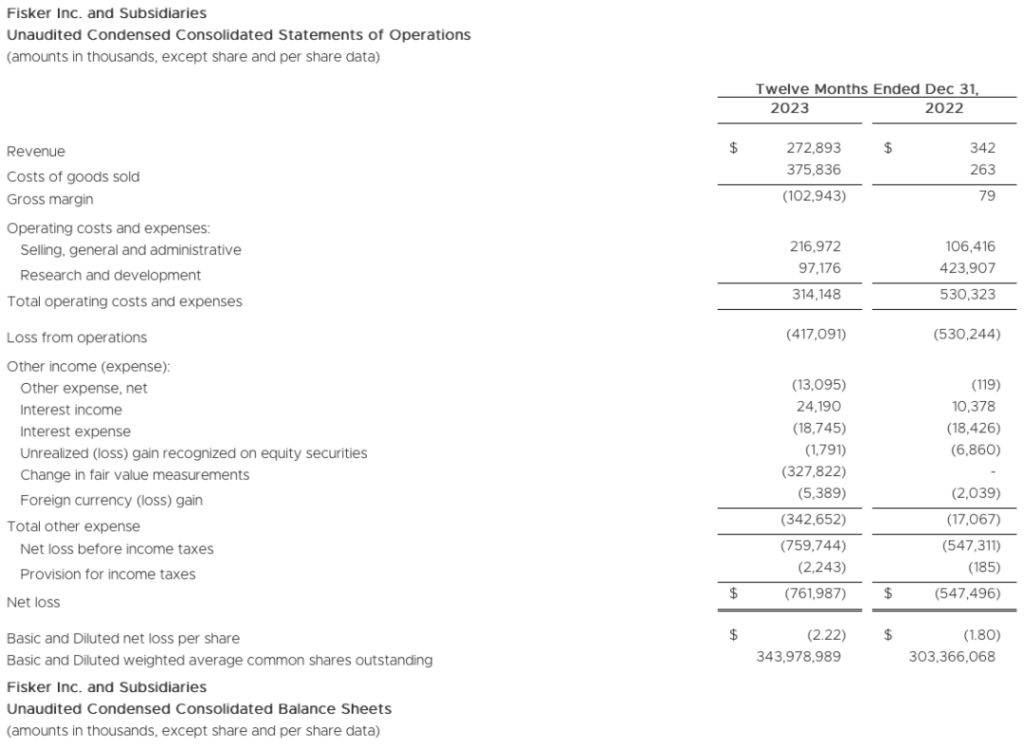While new Chinese carmakers are booming, American new carmakers are struggling. On March 18, American electric vehicle manufacturer Fisker said it would pause production of electric vehicles for six weeks. Fisker reiterated that the company is in talks with a major automaker about a potential deal, but did not disclose the specific name.
Earlier this month, Fisker CEO Henrik Fisker confirmed that he is in negotiations with a “major automaker” on financing matters, but did not directly name the automaker. Industry insiders believe that, given the market positions of both parties in the electric vehicle field, Nissan Motor is highly likely to be Fisker’s negotiating partner.
If Fisker can successfully reach a financing agreement with Nissan Motor, it will provide the necessary financial support for the former and may accelerate the cooperation between the two sides in electric vehicle technology and market expansion. For Nissan Motor, the collaboration with Fisker can further consolidate its position in the global electric vehicle market and drive technological innovation and development. However, it remains to be confirmed whether the partner is Nissan Motor, and the two sides have not signed any agreements on financing matters for the time being. However, the market will continue to pay attention to the development of this event, as it relates to Fisker’s survival.
On February 29, Fisker released its 2023 annual report, which showed that during the reporting period, Fisker achieved revenue of $273 million, compared to $342,000 in the same period; operating losses were $417 million, compared to $530 million in losses in the same period; net losses were $762 million, compared to $547 million in losses in the same period; as of December 31, 2023, Fisker had cash and cash equivalents of $325 million and restricted cash of $70.45 million.
In 2023, Fisker produced more than 10,000 vehicles in total, but the actual delivery volume was only about 4,700 vehicles. Fisker plans to deliver 20,000 to 22,000 Ocean electric vehicles in 2024, which is lower than the expected 35,600 vehicles. The company said that the current resources “are not enough” to support the company’s operations for the next 12 months. Without additional financing, Fisker said it may be forced to reduce Ocean production, reduce investments, scale back operations, and further lay off employees.

Now, Fisker has also reached a critical moment of life and death. On March 14, The Wall Street Journal reported that Fisker has hired FTI Consulting and Davis Polk law firm to assist in its bankruptcy filing. Insiders complained that Fisker may run out of cash this year. It issued a going concern warning last month, stating that there are “significant doubts” about its ability to continue operations. Affected by this news, Fisker’s stock price plunged 51.94% that day, setting a record low stock price of $0.14, with a current total market value of only $86.897 million.
In fact, not only Fisker is in trouble, but also once highly popular Rivian and Lucid. Recently, both companies have announced disappointing results.
On February 21, Rivian released its annual financial report, showing that in 2023, the annual revenue was $4.434 billion, a year-on-year increase of 167%, but at the same time, the loss was as high as $5.432 billion. In the financial report, Rivian announced that it would lay off 10% of its staff to cope with the severe situation of the electric vehicle market. It is understood that Rivian delivered a total of 50,100 new vehicles in 2023, which was significantly lower than market expectations. Tesla CEO Elon Musk said that at the current trajectory, Rivian would go bankrupt in about six quarters, adding “maybe that trajectory will change, but so far it hasn’t.” It is understood that as of December 31, 2023, Rivian’s cash reserve on the books was $7.9 billion.
Lucid’s situation is not optimistic either. The financial report shows that Lucid’s net loss in 2023 was $2.83 billion, an increase of 117% year-on-year. Lucid expects to produce 9,000 vehicles this year, far below analysts’ expectations of 14,000 vehicles. Last year, the company’s production was 8,428 vehicles. Calculated at a net loss of $2.83 billion, Lucid lost about $336,000 for every vehicle produced last year.
A few years ago, the new American carmakers, Rivian, Lucid, and Fisker, were all very successful. With the high interest of investors, the market value of these American electric vehicle manufacturers once had the potential to challenge Tesla. Today’s situation is not so optimistic. After the start of 2024, the “life and death shuffle” of new carmakers is staged globally. According to the survey of the financial situation of 10 new carmakers in the United States by “Automotive News in the United States”, most of them are faced with the predicament of cash flow shortage, and only four companies have enough cash on hand to maintain operations for more than a year.
